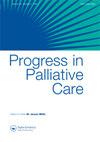Quality of Life and Quality of Care in patients with advanced Chronic Heart Failure (CHF) and advanced Chronic Obstructive Pulmonary Disease (COPD): Implication for Palliative Care from a prospective observational study
IF 0.8
Q4 PUBLIC, ENVIRONMENTAL & OCCUPATIONAL HEALTH
引用次数: 2
Abstract
Background: Patients with advanced CHF/COPD and their caregivers share many misconceptions about the life-limiting nature of their disease and when compared to cancer patients, CHF/COPD patients are less likely to receive Palliative Care. Aim: This observational prospective study explores (i) the quality of life (QoL) and symptom control and (ii) the quality of care in CHF/COPD patients in an acute hospital setting. Methods: Eligible patients and their informal caregivers filled in (i) the POS questionnaire that assesses the QoL and the symptom control and (ii) the CanHelp Lite questionnaire that assesses quality of care. These questionnaires were completed at inclusion and after a three-month-follow-up. Results: The majority of the participants were 60-79 years old with mild to moderate symptomatology. Older patients or patients with heavy symptoms declined participation. Both patients and caregivers share common and overall positive beliefs concerning patients' QoL and quality of care. Conclusions: The severity of the healthcare condition of the included patients appears to at odds with their positive evaluation of QoL and quality of care. Possible factors contributing to this finding might be the reluctance of physicians to engage to uncomfortable conversations, the patients' denial of “bad-news” and the overall taboo of communication about death.晚期慢性心力衰竭(CHF)和晚期慢性阻塞性肺病(COPD)患者的生活质量和护理质量:一项前瞻性观察性研究对姑息治疗的启示
背景:晚期慢性心力衰竭/慢性阻塞性肺病患者及其护理人员对其疾病的减轻生命性质有许多误解,与癌症患者相比,慢性心力衰竭/慢阻肺患者接受姑息治疗的可能性较小。目的:这项观察性前瞻性研究探讨了(i)急性医院环境中CHF/COPD患者的生活质量(QoL)和症状控制,以及(ii)护理质量。方法:符合条件的患者及其非正式护理人员填写(i)评估生活质量和症状控制的POS问卷,以及(ii)评估护理质量的CanHelp-Lite问卷。这些问卷是在纳入时和经过三个月的随访后完成的。结果:大多数参与者年龄在60-79岁之间,有轻度至中度症状。老年患者或症状严重的患者拒绝参与。患者和护理人员对患者的生活质量和护理质量有着共同的、总体上积极的信念。结论:纳入患者健康状况的严重程度似乎与他们对生活质量和护理质量的积极评价不一致。促成这一发现的可能因素可能是医生不愿进行令人不舒服的对话,患者否认“坏消息”,以及对死亡沟通的总体禁忌。
本文章由计算机程序翻译,如有差异,请以英文原文为准。
求助全文
约1分钟内获得全文
求助全文
来源期刊

PROGRESS IN PALLIATIVE CARE
PUBLIC, ENVIRONMENTAL & OCCUPATIONAL HEALTH-
CiteScore
2.60
自引率
11.80%
发文量
24
期刊介绍:
Progress in Palliative Care is a peer reviewed, multidisciplinary journal with an international perspective. It provides a central point of reference for all members of the palliative care community: medical consultants, nurses, hospital support teams, home care teams, hospice directors and administrators, pain centre staff, social workers, chaplains, counsellors, information staff, paramedical staff and self-help groups. The emphasis of the journal is on the rapid exchange of information amongst those working in palliative care. Progress in Palliative Care embraces all aspects of the management of the problems of end-stage disease.
 求助内容:
求助内容: 应助结果提醒方式:
应助结果提醒方式:


